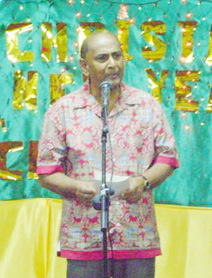PNCR Chairman Bishwaishwar Ramsaroop has said that the party’s Congress last weekend is the de facto start of the PNCR election campaign for 2011 and it also marked a new dimension and manifestation of democracy within the party.
The party chairman in welcoming more than one thousand delegates and observers from the ten regions of Guyana and the North American and United Kingdom regions of the party noted that the Congress had “consummated a process which for the first time witnessed the election of a presidential candidate other than the incumbent leader of the party.”

He said also that it had ushered in a new dynamic for the party, according to a PNCR press release.
The release said the Congress was a historic event in having the first primaries for a presidential candidate for any political party in Guyana.
Eight hundred and twenty-seven delegates and almost two hundred observers were formally accredited after the strict application of the Constitution of the PNCR, the release said.
And voting was by secret ballot with delegates required to use one of the four polling booths at the location. Delegates were required to surrender their delegate wrist band when they collected their ballot and the entire process was conducted in full view of the Congress delegates in the auditorium.
In his acceptance speech, retired Brigadier David Granger “pledged to work with all the nominees and the party to ensure that the dictatorial PPP/C regime was removed from office at the forthcoming General and Regional Elections later this year,” the release stated.
Meanwhile, the Accreditation Committee, after evaluating previous experiences at PNCR’s internal elections, outlined several procedures to be followed for the Special Congress that were fully implemented. These arrangements, the release stated, included the publication of the names of all financial members of the PNCR, which information was available for scrutiny by all candidates and interested members several weeks before the Congress. The list was also sent to all party groups to provide an opportunity for comparison with their individual records and to query any discrepancies, if any were found.
At the conclusion of this process, groups were required to submit the names of their delegates and observers in advance, which were also subject to scrutiny. The Accreditation Committee also introduced new rules for registration which included the presentation by the delegate of a photo identification and a membership card. Special wrist bands were also placed around the hand of each delegate at the time of registration, which was only removed by election agents when that delegate had received a ballot paper prior to voting.
Moreover, all the candidates appointed scrutineers to monitor all aspects of the process, including, the counting of the ballots, until the declaration of results by the Returning Officer.
Against that background, the PNCR has stated “categorically that there was no controversy or confusion over the results of the election when they were declared by the Returning Officer.”
The PNCR said further that it had “to correct misinformation published in some media and emphasise that there was only one declaration of the official results by the Returning Officer. Consequently, there could have been no differing results as claimed by two sections of the media.”
Meanwhile, Party Leader Robert Corbin in his address emphasised that the historic nature and significance of the Congress ought to be appreciated by all. According to him, the party was breaking new ground in Guyana and leading the way in the transformation of the political culture.
For the first time in its fifty-six year history, Corbin pointed out, the party membership had been given the opportunity to determine who should be its presidential candidate.
He also observed that despite universal acceptance of the principle of primaries by successive executives of the party, there were many practical difficulties and challenges which militated against its implementation. Corbin expressed the hope, however, that the system of primaries would now become institutionalised in the PNCR, irrespective of the practices of other parties in Guyana, the release added.




